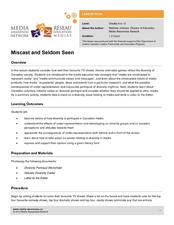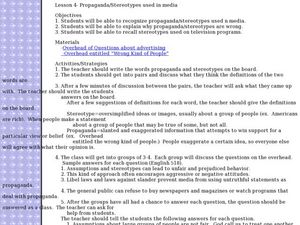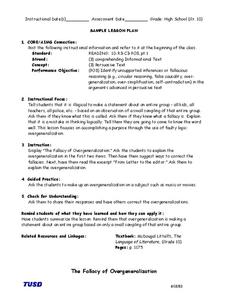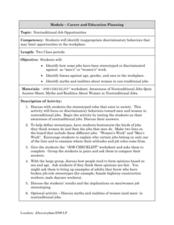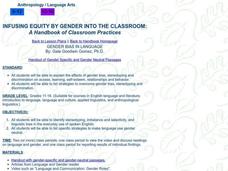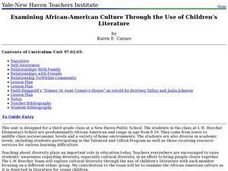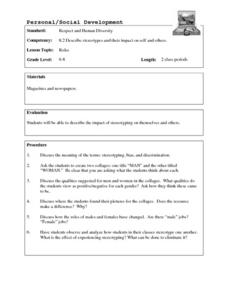Curated OER
Miscast and Seldom Seen
Consider how well students' favorite TV shows, movies and video games reflect the diversity of society. The lesson introduces your class to several media literacy concepts, such as how media conveys values and messages, as well as the...
Curated OER
Propaganda/Stereotypes Used in the Media
Students write a character sketch on a television character who they feel is a stereotype. In this propaganda/stereotype lesson, students discuss the definition of the terms and ways that the media uses both. Students relate the use of...
Curated OER
"Snapshot" Exercises & Sensory Detail Word Bank
Read a sample of creative descriptive writing to your science class. Discuss how writing can be used to record and communicate observations that scientists make. Reading selections and thought-provoking questions are suggested. Also...
Curated OER
CAN WE SWITCH GENDERS OF STORY CHARACTERS?
Analyze characters and stories to identify stereotyping. Learners will examine the concept of character gender to evaluate bias in classroom story books. They are asked to read a story or play and change the gender of the character to...
Curated OER
The "Ad" Survey-What Makes a Print Ad Convincing?
Students develop opinions from a variety of materials, recognize and analyze bias, propaganda and stereotypes, and evaluate effectiveness of print advertisements.
Curated OER
What Makes a Cat a Cat?
Students investigate the lives of pets by videotaping them. In this animal life activity, students videotape a cat and other pets using school cameras in a computer lab. Students review the footage from the cat and other animals and...
Curated OER
Comprehending Informational Text
Do you know what a fallacy is? Discuss this term and its meaning with your class. Then, talk about why making generalizations about a large group of people isn't the best thing to do. As a group, study the included letter excerpt. It...
The New York Times
Collateral Damage? Researching a Connection Between Video Games and Violence
Hook your class into an exploration of and discussion about violence in video games with a cute animal clip and a video game trailer. After a quick discussion about how media can affect mood, class members read a related article and...
Curated OER
Nontraditional Job Opportunities
As your learners prepare to enter the workforce, address some common stereotypes that may be limiting their professional goals. The class brainstorms gender-stereotyped careers, exploring where those ideas originate. They complete a job...
TV411
Avoid Mushy Writing: Be Specific
Replacing, bland, inexact generalizations with specific statement and precise information is the focus of a worksheet that models how to transform general statements into specific ones. After examining four models, learners have an...
Curated OER
Perceptions - Difference
Learners explore different perceptions and differences between people. They incorporate the themes of stereotypes, prejudice and discrimination. Students comprehend that people have different perceptions of the same phenomenon. They...
Curated OER
Valentine Candy Count
Students analyze a bag of Valentine candy to create a graph. In this graphing lesson, students make predictions, sort by color, record data and make a graph. Students discuss results and make generalizations. Students generate their own...
Curated OER
Those Who Don't Know: Identity, Membership, and Stereotypes
Students explore their identities. In this social studies lesson, students examine stereotyping and discuss factors that define their personal identities. Students compare their stories to the story of Esperanza in the novel Esperanza...
Curated OER
Children's Literature and African American Culture
Third graders examine various stories and poems and identify characteristics that make each individual unique. After analyzing the readings, they create their own personality poems to accompany self-portrait drawings. The poems and...
Curated OER
Woman Power!!! Mathematics Camp
Students explore mathematics by researching stereotypes. In this gender bias lesson, students participate in discussions where they identify traditional careers according to their own gender. Female students attend summer camp and...
Curated OER
Math News
Young writers design and publish a newsletter with articles that demonstrate knowledge of mathematical concepts. They explain mathematical procedures and basic operations in a news article format. Next, they compile several articles to...
Curated OER
Reading For Meaning
Select an article that explores people of another culture. After reading it as a class, distribute copies of this worksheet. It asks for a brief summary, encourages readers to make text-to-self connections, and asks learners to identify...
Curated OER
Discrimination
Students examine concept of discrimination and explore difference between appropriate and harmful discrimination. Students discuss relevant Australian legislation and International Law, choose example of discrimination, and write...
Curated OER
Men of Steel
Learners explore early 20th century steel making. In this U.S. history steel making lesson, students view and describe a postcard and a picture depicting exaggerated aspects of the steel industry. Learners listen to a poem about Joe...
Curated OER
Casting Doubt: "Color-blind" and Nontraditional Casting Decisions
In his article about color-blind casting entitled, "Willy Loman Is Lost, Still Looking for Stimulus Plan and Some Dignity," Charles Isherwood quotes August Wilson as saying, "To mount an all-black production of a 'Death of a Salesman'...
Curated OER
Fallacies of Weak Induction
A high-level introduction to fallacies of weak induction, including appeals to unqualified authority and ignorance, hasty generalizations, and weak analogies. Each fallacy is defined and shown with an example. For use mostly in college...
Curated OER
Roles
Middle schoolers discuss the meaning of the words: stereotypes, bias, and discrimination. They create two collages, one for women and one for men. They brainstorm ideas on why they picked the pictures they did.
Curated OER
Discrimination Hurts
Fifth graders interpret stereotyping and discrimination as limiting and hurtful behaviors and demonstrate how to address these behaviors in a positive manner. In this discrimination lesson plan, 5th graders use the poem The Woman Who...


